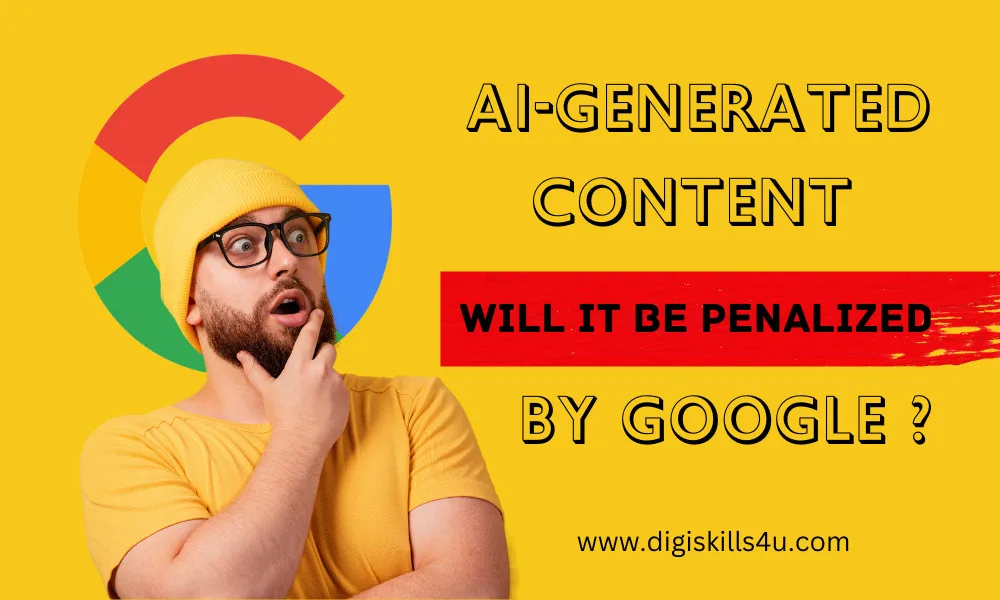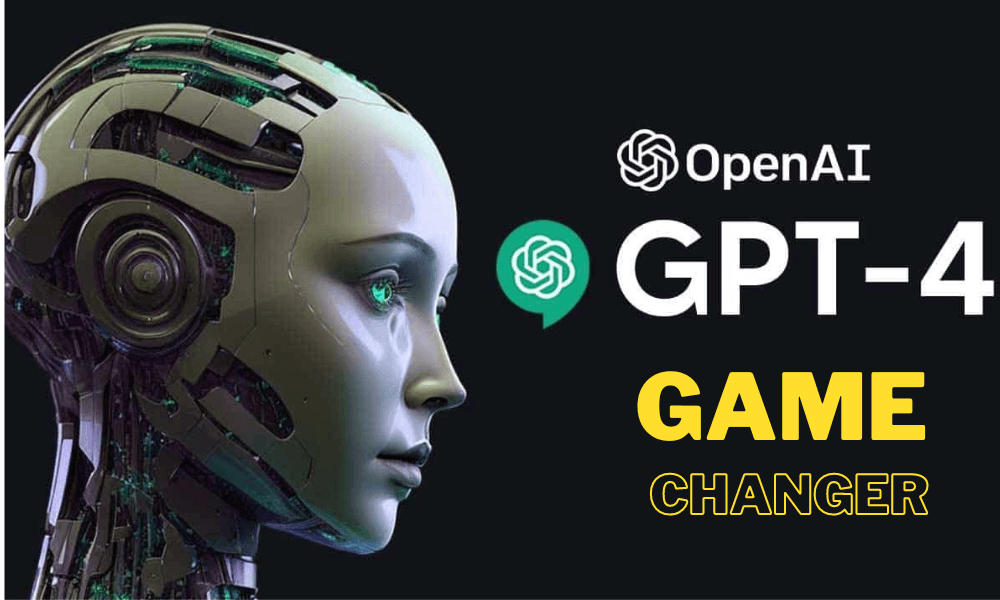Last updated on May 22nd, 2024 at 01:24 pm
In an era of rapidly evolving content creation, the persistent debate surrounding AI-generated content has captured the attention of creators and digital strategists alike. The burning question on everyone’s mind is whether Google will impose penalties on content generated by artificial intelligence. Join us as we embark on a comprehensive exploration of this pivotal topic, unraveling its core aspects and implications.
Understanding AI-Generated Content
AI-generated content pertains to text generated by software rather than human authors. This field is swiftly evolving, propelled by advancements in natural language processing and machine learning. AI-writing tools have several benefits, including scalability, elevated content quality, and reduced research time.
Yet, concerns often emerge regarding the ability of search engines, particularly Google, to detect AI-generated content. As emphasized in the article, Google and other tools have become increasingly adept at identifying AI-generated content. They employ various techniques, including natural language processing, to analyze patterns and syntax unique to computer-generated writing.
Deciphering Google’s “Helpful Content Update”
A pivotal factor in deciphering Google’s view on AI-generated content comes from the “helpful content update.” This update serves as a guiding light, designed to champion content that meets the following criteria:
- It’s created with a specific audience in mind.
- It demonstrates expertise in the subject matter.
- It’s published on websites with a clear focus.
- It satisfies user queries and search intent effectively.
- It adheres to Google’s webmaster guidelines, including E-A-T (Expertise, Authoritativeness, Trustworthiness).
Google’s main concern is content quality and relevance, no matter how it’s made. Recent updates focus on low-quality content and spam, not just AI-generated content.
We aim to clarify the relationship between AI-generated content and Google’s rankings. While Google doesn’t penalize AI-generated content directly, it’s crucial to grasp the bigger picture and the importance of quality in content creation.
Balancing AI and Human Touch with “C.R.A.F.T. Editing”
In the age of AI-powered content creation, the question arises: can AI content ever truly compete with the quality and effectiveness of human-written content?
While AI has made significant strides in generating factual information, it often lacks the human touch that fosters trust, engagement, and strong search ranking. This is where C.R.A.F.T. editing comes in.
C.R.A.F.T. stands for a set of essential editing techniques that bridge the gap between AI-generated content and human-quality writing. By applying C.R.A.F.T. principles, editors can transform AI output into informative, engaging, and SEO-friendly pieces that resonate with readers and rank well in search results.
Let’s delve deeper into each aspect of C.R.A.F.T. editing and explore how it empowers editors to unlock the full potential of AI-generated content.
C – Clear: Clarity Through Human Scrutiny
- AI-generated content can sometimes be grammatically correct but lack clarity due to unnatural phrasing or sentence structure.
- Human editors can ensure the content reads smoothly and is easy for the target audience to understand. This involves:
- Identifying and correcting awkward sentence structures.
- Replacing overly technical terms with simpler language.
- Ensuring logical flow of ideas between paragraphs.
R – Relevant: Understanding User Intent
- AI may struggle to fully grasp the specific needs and interests of the target audience.
- Human editors can ensure the content aligns with search intent by:
- Analyzing search queries related to the topic.
- Tailoring the content to answer the specific questions users have.
- Focusing on the most relevant information for the audience.
A – Authoritative: Building Trust with Credibility
- While AI can generate factual content, it often lacks the ability to build trust and authority.
- Human editors can elevate the credibility of AI-generated content by:
- Fact-checking all information and citing reliable sources.
- Identifying and addressing potential biases in the AI output.
- Adding expert commentary or insights from trusted figures in the field.
F – Fresh: Injecting Human Creativity
- AI-generated content can be repetitive or lack originality.
- Human editors can enhance the content’s freshness and creativity by:
- Adding unique examples, case studies, or anecdotes to illustrate points.
- Introducing new perspectives or interpretations of the topic.
- Incorporating humor, storytelling elements, or other creative writing techniques to engage readers.
T – Targeted: Optimizing for Discoverability
- AI may not be adept at SEO optimization.
- Human editors can ensure the content reaches its intended audience by:
- Researching and using relevant keywords organically throughout the text.
- Optimizing meta descriptions and title tags for search engines.
- Structuring the content with clear headings and subheadings.
By applying C.R.A.F.T. editing, human editors can transform AI-generated content into high-quality, informative, and engaging pieces that rank well in search results and resonate with the target audience.
This approach leverages the efficiency of AI while capitalizing on the irreplaceable value of human expertise and creativity.
Does Google Penalize AI Content?
In the ever-evolving world of tech and content, the big question is whether Google comes down hard on AI-generated content. But here’s the scoop: Google’s mission is all about quality and relevance. Many creators have ventured into AI content, meticulously crafted and well-executed.
The upshot? Not just visibility but great rankings in the digital realm. The key takeaway: as long as your content enriches your audience, search engine penalties are unlikely. What Google values is content that truly benefits users. It’s the essence of the helpful content update – catering to your audience, showcasing expertise, matching user intent, and sticking to E-A-T principles (Expertise, Authoritativeness, Trustworthiness).
In a nutshell, Google’s mantra is simple yet profound: Quality and relevance rule. It’s not about where content originates; it’s how it connects with your audience and meets their needs. This perspective on AI-generated content is a breath of fresh air for creators. It dispels fears of AI-induced penalties and champions a partnership between AI efficiency and human expertise to create extraordinary content.
This harmonious blend of AI and human creativity represents the future of content. In a world where AI is the present, embracing it ethically and imaginatively is a mark of success. As the digital landscape evolves, one thing is crystal clear: Google’s unwavering commitment to rewarding creators of valuable, original, and audience-centric content. It’s not about AI as a foe; it’s about using it to craft content that inspires, educates, and enthralls.
Leveraging AI Ethically
The digital world has changed a lot because of AI and machine learning. These technologies have shaken up the old ways of doing things, especially for content creators and digital marketers. AI’s real magic is how it automates processes, makes things run smoother, and improves the quality of content by a lot.
But, it’s crucial to use AI responsibly. We need to remember that even though AI gives us amazing abilities, we must use them for the greater good. This responsibility is super important in content creation, where trust, being genuine, and giving users a great experience matter the most.
AI tools have totally changed how we create content. They take care of boring tasks, make things more efficient, and let us create a ton of content really fast. But, this doesn’t mean we should forget about human input. Instead, it’s an invitation to blend human creativity with AI’s efficiency.
As AI and human collaboration improve, the content we create combines precision, velocity, inventiveness, context, and wisdom in an exquisite way. This incredible synergy signals the beginning of a new era in content creation where efficiency soars, costs drop, and the entire process advances.
Using AI ethically in content creation is more than just getting things done quickly. It’s about keeping the true essence of creativity and authentic information alive in the digital age.
Concluding Thoughts: Google’s Emphasis on High-Quality Content
As we journeyed through the realm of AI-generated content and its intriguing tango with Google’s algorithms, a fundamental revelation became crystal clear: Google’s heart beats for quality and relevance, giving no cause to penalize AI-generated content.
AI-generated content offers scalability and efficiency, but concerns linger about its detection by search engines. Google’s “helpful content update” underscores its emphasis on user-centric, high-quality content, rather than the method of creation.
The C.R.A.F.T. editing framework shines a spotlight on the powerful partnership of AI and human ingenuity, enhancing content quality by eliminating excess, fine-tuning for SEO, enhancing visuals, ensuring accuracy, and infusing a personal touch.
Moreover, Google’s affection leans towards content that wholeheartedly embraces the E-A-T principles (expertise, authority, trustworthiness) and delivers authentic value. Ethical AI application amplifies the vital role of preserving the genuine user experience.
In a landscape where AI and human ingenuity unite, Google’s unwavering focus on quality prevails. It’s not about the source of content but its impact, setting the stage for a future where AI and human creativity coexist to educate, captivate, and inspire.




